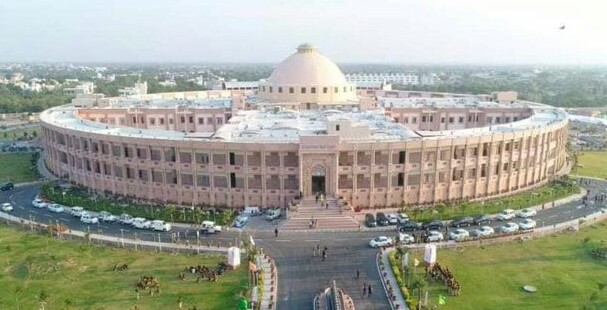TwoCircles.net News Desk
The Rajasthan High Court recently reinforced the jurisdictional boundaries of civil courts concerning religious properties, particularly mosques. The court, in a key ruling dated February 22, 2025, declared that a mosque, as a place for religious activities like offering namaz (prayer), falls under the definition of ‘Waqf’ as per Section 3(r) of the Waqf Act, 1995 :As a result, any disputes regarding such properties must be handled by a Waqf Tribunal, not a civil court.
According to LiveLaw, a bench, led by Justice Birendra Kumar, in his judgment, referred to Section 85 of the Waqf Act, which imposes a bar on civil courts from hearing matters related to Waqf properties.
The court’s order stated, “It is not disputed that Masjid is a place used for religious purpose for praying Namaz etc., therefore, it comes within the definition of ‘Waqf’ and once the suit property is Waqf, any dispute in respect of the Waqf property is to be adjudicated by the Waqf Tribunal only and not by any other court including civil court in view of the bar under Section 85 of the Waqf Act.”
This judgment stemmed from a civil revision petition where two petitioners (Case title: Shakur Shah and another vs. Iliyas and others), who were the original defendants in a case involving the Madina Jama Masjid, challenged an order by the Civil Judge in Phalodi. The case centered around the mosque, which the petitioners claimed they had rightful ownership over. The plaintiffs (respondents), on the other hand, sought an injunction to prevent the petitioners from disturbing the peaceful religious practices at the mosque, particularly the offering of namaz.
The petitioners, as per the report, had filed an application to dismiss the case under Order 7, Rule 11 of the Civil Procedure Code (CPC), arguing that the dispute should be heard by a Waqf Tribunal instead of a civil court. They emphasised that the subject matter of the dispute concerned Waqf property, and as such, it fell outside the jurisdiction of the civil courts. The Civil Court, however, rejected their plea and stated that the mosque was not officially recorded in the waqf register; and therefore, did not qualify as waqf property.
The High Court disagreed with this interpretation. The court emphasised that a mosque, by virtue of its use for religious purposes such as namaz, is inherently a waqf property, even if not registered as such.
As the bench pointed out that “…the claim of the plaintiffs concerned permanent dedication of the immovable property for the construction of a Masjid for the purpose recognised by the Muslim Law as religious and included other items disclosed in the definition of Waqf under Section 3(r) of the 1995 Act”, it thus concluded that the mosque was indeed a waqf property, and any dispute regarding it should be resolved exclusively by a Waqf Tribunal.
The court allowed the civil revision petition and ruled that the civil court had wrongly exercised jurisdiction. The court directed that the plaint be rejected under Order 7, Rule 11(d) of the CPC, and granted the plaintiffs the liberty to approach the Waqf Tribunal within four weeks.
Waqf refers to the act of dedicating property for religious or charitable purposes, with ownership being permanently transferred from the individual to Allah. The person who establishes this dedication is known as the ‘waqif,’ and he/she designates a beneficiary to receive the benefits of the property.
The HC ruling not only reaffirms the special status of waqf properties but also sheds light on the importance of the Waqf Tribunal in resolving such disputes. It highlights the principle that religious properties, once dedicated as waqf, are not subject to the jurisdiction of civil courts.
The decision is also timely in view of recent legislative developments. In August of last year, two bills — the Waqf (Amendment) Bill, 2024, and the Mussalman Wakf (Repeal) Bill, 2024 — were introduced in the Lok Sabha to streamline the administration of Waqf properties. Claimed to be aimed at streamlining the Waqf Board’s work and ensuring an efficient management of waqf properties, these bills, which were sent to a Joint Parliamentary Committee (JPC) last year propose some changes, including the removal of the concept of “waqf by user” clause (i) of Section 3(r) of the present 1995 Act , which has historically allowed properties used for religious purposes, such as mosques, to be considered waqf even without formal documentation.
The court’s emphasis on the Waqf Tribunal’s exclusive jurisdiction aligns with these proposed changes, which call for the specialised legal framework that governs religious properties under Islamic law. As Justice Kumar noted, “any dispute in respect of the Waqf property is to be adjudicated by the Waqf Tribunal only,” thereby reinforcing the legal protections for waqf properties and their intended religious or charitable purposes.


